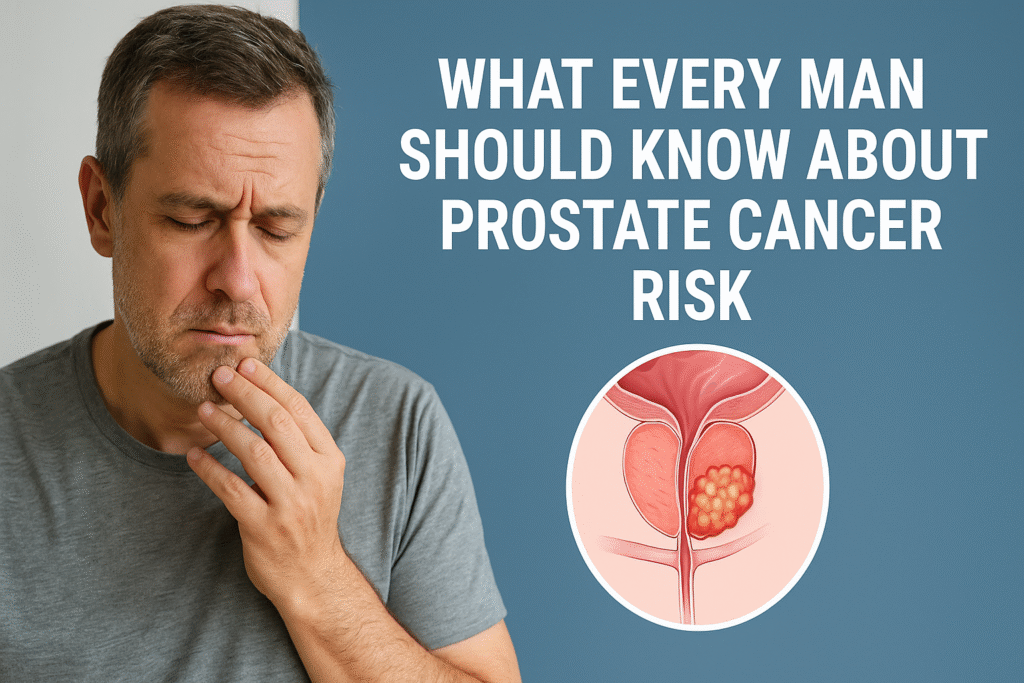What Every Man Should Know About Prostate Cancer Risk
What Every Man Should Know About Prostate Cancer Risk
Prostate cancer is one of the most common types of cancer affecting men worldwide, particularly those above the age of 50. While early detection and treatment have drastically improved outcomes, many men remain unaware of their risk factors and symptoms. This lack of awareness can delay diagnosis and worsen the prognosis.
If you’re a man over 40 or have a family history of prostate issues, it’s time to educate yourself about this silent threat. As a leading Urologist In Pune, I aim to guide men toward a proactive approach to prostate health and provide insight into Prostate Cancer Treatment In Pune options.
Understanding the Prostate
The prostate is a small, walnut-sized gland located just below the bladder and in front of the rectum. It plays a crucial role in producing seminal fluid, which nourishes and transports sperm. As men age, changes in the prostate are common. These can range from benign enlargement (BPH) to infections, or in more serious cases, cancer.
What Is Prostate Cancer?
Prostate cancer occurs when cells in the prostate gland begin to grow uncontrollably. While many cases progress slowly and remain confined to the gland, aggressive forms can spread rapidly to other parts of the body, including the bones and lymph nodes.
It is important to note that not all prostate growths are cancerous, but regular checkups with a Urology Doctor In Pune can help distinguish between benign and malignant conditions.
Who Is At Risk?
Several risk factors have been identified for prostate cancer. Knowing them can help you take timely preventive action:
1. Age
The risk of prostate cancer increases significantly after the age of 50. Nearly 60% of cases are diagnosed in men over the age of 65.
2. Family History
Men with a father, brother, or close relative who had prostate cancer are at higher risk. Genetic factors play a crucial role.
3. Race
Studies have shown that African-American men are more likely to develop and die from prostate cancer than men of other ethnicities. While this is less common in India, it’s important to monitor regional and demographic trends.
4. Diet and Lifestyle
A diet high in red meat and low in vegetables, along with obesity and sedentary behavior, can increase your risk.
5. Smoking and Alcohol
Excessive alcohol intake and smoking can not only increase the risk of prostate cancer but also affect overall prostate health.
Common Symptoms to Watch Out For
In many cases, prostate cancer develops silently with no early symptoms. However, as it progresses, the following signs may appear:
- Frequent urination, especially at night
- Difficulty starting or stopping urination
- Weak or interrupted urine flow
- Painful urination or ejaculation
- Blood in urine or semen
- Persistent pain in the lower back, hips, or pelvis
If you notice any of these symptoms, do not ignore them. Schedule an evaluation with a trusted Urology Doctor In Pune to rule out serious conditions.
Importance of Early Detection
When detected early, prostate cancer is highly treatable. Screening options such as the PSA (Prostate-Specific Antigen) blood test and digital rectal exams (DRE) can help identify issues before symptoms even appear.
Men over 50, or those with risk factors, should discuss routine screening with a Urologist In Pune. For high-risk individuals, screenings may be recommended even earlier.
Diagnosis and Treatment Options
If your doctor suspects prostate cancer, additional diagnostic tests such as imaging (MRI, CT scan) and a prostate biopsy may be required.
Treatment plans depend on several factors such as cancer stage, grade, age, and overall health. Common Prostate Cancer Treatment In Pune includes:
1. Active Surveillance
For slow-growing cancer, doctors may recommend monitoring it regularly rather than immediate treatment.
2. Surgery
Radical prostatectomy involves the surgical removal of the prostate gland. It’s commonly advised for early-stage cancer in healthy men.
3. Radiation Therapy
External beam radiation or brachytherapy (internal radiation) targets and kills cancer cells while sparing surrounding tissue.
4. Hormone Therapy
Used to stop the production of testosterone, which fuels cancer growth. Often combined with radiation in advanced stages.
5. Chemotherapy
Recommended when cancer spreads beyond the prostate and doesn’t respond to hormone therapy.
At our clinic, we offer advanced, personalized Prostate Treatment In Pune tailored to each patient’s specific condition and lifestyle.
Preventive Measures
While you can’t change your age or genetics, you can take steps to reduce your prostate cancer risk:
- Maintain a balanced diet rich in fruits, vegetables, and whole grains
- Stay physically active and maintain a healthy weight
- Avoid smoking and limit alcohol intake
- Stay informed and schedule regular prostate health checkups
As a dedicated Urology Doctor In Pune, I advise all men to prioritize their urological health. Awareness, early detection, and timely medical intervention are your best tools against prostate cancer.
Final Thoughts
Prostate cancer doesn’t have to be a silent killer. With awareness, proactive screening, and expert care, most cases can be managed effectively. If you or a loved one are concerned about prostate health, don’t hesitate to consult a specialized Urologist In Pune.
Our clinic offers comprehensive diagnostic and Prostate Cancer Treatment In Pune, backed by advanced technology and compassionate care. We are here to support you every step of the way.
Take charge of your health—because prevention is always better than cure.
For expert consultation and advanced Prostate Treatment In Pune, book your appointment with Dr. Rakshit Ahuja today.
📞 Book an Appointment: 98905 83933
🌐 Visit Our Website: www.drrakshitahujaurologist.com


 Select an element to maximize. Press ESC to cancel.
Select an element to maximize. Press ESC to cancel.